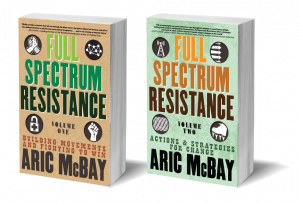We fight because most people won’t. Most of the globally wealthy are too privileged, too indoctrinated, too shortsighted, or too distracted by the twenty-four-hour media spectacle to fight back. And most of the globally poor are preoccupied with daily survival and other primary emergencies. (That said, the dispossessed are still fighting a hell of a lot harder than the privileged.)
Education alone is never going to be enough. “Education often becomes an impediment to the things we should be doing,” argues Indigenous resister Shawn Brant of Tyendinaga. We could spend decades saying the same thing over and over, but if we wait until we convince everyone we will be waiting forever. “Not everyone is going to like us.”
The left believes in education and truth. These are wonderful things. But the belief that truth will inevitably win out over falsehood and that history is a one-way roller coaster of human progress is a dangerous mythology. (Look at Donald Trump, or the growing popularity of authoritarian leaders in many countries.) It is tempting to believe that if the global system truly gets bad enough then people will finally take action.
Public opinion surveys on global warming offer a refutation of such ideas. In theory, public education about the dangers of greenhouse gases should lead to ever-growing support for solutions. At the very least, more people would acknowledge the existence of global warming. But a large percentage of people in the countries with the greatest carbon emissions, such as the United States, are still desperate to ignore climate change.29 A 2016 study by the Pew Research Center found that 52 percent of adults in the United States do not believe humans are causing climate change. They also found that between 2009 and 2014 the number of Americans who believed climate change is not happening at all actually increased from 11 percent to 25 percent.30
While people in general are becoming more aware of climate change over time, those on the right continue to deny—polls found that after Trump’s election, Republican voters were more likely to deny that climate change was happening at all.31
This increase in denial is partly the result of persistent propaganda campaigns funded by industry groups. And even as public opinion has shifted in some places to ignore climate change, greenhouse emissions have reached terrible new heights, and almost every year on Earth breaks a new temperature record. But this public apathy is also driven by a lack of serious action—psychological research shows that when people do not make an appropriate response to an emergency, bystanders mentally downgrade the seriousness of the situation.
The idea that action will finally happen when things get bad enough was even present in Germany as Nazi influence grew. Many Communists believed that once Hitler gained power he would finally be revealed for the monster he was—then the working class would rise up and fight. The slogan of the German Communist Party in the early 1930s was “After Hitler comes us.” Using this slogan, the Communist Party refused to enter into a coalition with the Social Democrats to stop the rise of Hitler, believing that a backlash against the Nazis would thrust them into power. As German history sadly proved, the “worse is better” theory drastically underestimates the power of political repression to destroy movements.32
Indeed, even after the Nuremberg Trials and the exposure of the concentration camps, only 20 percent of Germans said that it would have been acceptable to resist Hitler during World War II.33 Often resistance must happen before a change in mass consciousness and not the other way around.
Some leftists believed that George W. Bush’s election would be good news and that if elected his transparent warmongering and corporate favoritism would galvanize public opposition and push the political spectrum to the left. But the opposite happened—the left was cowed into submission after 9/11 and Bush’s popularity skyrocketed to ensure his election to a second term. And a second term for Trump surely won’t be good.
I wish I could believe that there will be some grand, operatic uprising in the eleventh hour. But neither history nor current events offer support for this. This is not an easy reality to accept, but it is one we must acknowledge and act within.


